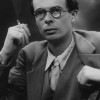We must learn how to handle words effectively; but at the same time we must preserve and, if necessary, intensify our ability to look at the world directly and not through that half opaque medium of concepts, which distorts every given fact into the all too familiar likeness of some generic label or explanatory abstraction.
Aldous Leonard Huxley (26 July 1894 – 22 November 1963) was an English writer and philosopher.
He authored nearly fifty books—both novels and non-fiction works—as well as wide-ranging essays, narratives, and poems.
Born into the prominent Huxley family, he graduated from Balliol College, Oxford with an undergraduate degree in English literature. Early in his career, he published short stories and poetry and edited the literary magazine Oxford Poetry, before going on to publish travel writing, satire, and screenplays. He spent the latter part of his life in the United States, living in Los Angeles from 1937 until his death. By the end of his life, Huxley was widely acknowledged as one of the foremost intellectuals of his time. He was nominated for the Nobel Prize in Literature seven times and was elected Companion of Literature by the Royal Society of Literature in 1962.Huxley was a humanist and pacifist. He grew interested in philosophical mysticism and universalism, addressing these subjects with works such as The Perennial Philosophy (1945)—which illustrates commonalities between Western and Eastern mysticism—and The Doors of Perception (1954)—which interprets his own psychedelic experience with mescaline. In his most famous novel Brave New World (1932) and his final novel Island (1962), he presented his vision of dystopia and utopia, respectively.
